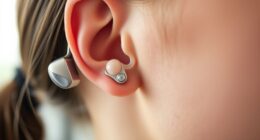Understanding eating disorders starts with recognizing how body image issues and societal standards affect you. Negative perceptions of your body can lead to unhealthy habits like restrictive dieting or binge eating, often driven by feelings of inadequacy. Societal images of “perfect” bodies create pressure and distort your self-view. By becoming aware of these influences and focusing on self-acceptance and inner health, you can take steps toward recovery. Keep exploring to discover how external pressures shape your journey.
Key Takeaways
- Recognizing the impact of negative body image and societal standards is vital for early identification of eating disorders.
- Challenging societal influences and fostering self-acceptance aid in preventing and recovering from disordered eating behaviors.
- Building awareness involves understanding how external pressures distort self-perception and emotional well-being.
- Recovery emphasizes self-compassion, patience, and shifting focus from appearance to overall health and emotional resilience.
- Support systems and external resources are crucial in promoting awareness and facilitating sustainable recovery.

Have you ever wondered why some people develop unhealthy eating habits? Often, it’s not just about food itself but about how they view themselves. Body image plays a huge role in shaping our relationship with food, and societal influences can deeply impact how you see your own body. From a young age, you’re exposed to images of perfect physiques in magazines, social media, and television. These visuals create a narrow standard of beauty that feels almost impossible to attain. When you compare yourself to these idealized images, it’s easy to develop feelings of inadequacy or self-criticism. Over time, these feelings can lead to unhealthy behaviors, such as restrictive dieting, binge eating, or purging, as you try to control or alter your appearance.
Body image influences eating habits; societal standards often create feelings of inadequacy and unhealthy behaviors.
Societal influences don’t just shape your perception of beauty—they also reinforce the idea that thinness equals success, happiness, or acceptance. You might hear comments or see messages that equate worth with weight, leading you to believe that losing weight or maintaining a certain body shape is essential for social approval. This constant messaging can make you obsess over your body, fueling negative thoughts and anxiety. When your self-esteem becomes tied to your appearance, it’s easy to fall into dangerous eating patterns. You may start to see your body through a distorted lens, viewing it as flawed or unworthy, which only worsens your emotional well-being. Recognizing that societal standards are often unrealistic and unattainable can help foster a more compassionate attitude toward yourself.
Understanding that these societal influences are pervasive helps you realize that your feelings aren’t your fault. They’re shaped by an environment that prioritizes superficial ideals over genuine health and self-acceptance. Recognizing this is a vital step toward recovery. Once you identify how external pressures distort your body image, you can begin to challenge those beliefs. It’s important to remember that everyone’s body is unique and that beauty isn’t defined by a specific size or shape. Building a healthier body image involves shifting focus from appearance to how you feel physically and emotionally. Emphasizing self-care, inner strength, and authenticity can help you develop a more compassionate view of yourself, reducing the grip of societal standards.
In the end, recovery starts with awareness. When you understand the influence of societal messages and work to foster a positive body image, you create a foundation for healing. It’s a process that involves patience, support, and a commitment to valuing yourself beyond external appearances. By challenging harmful norms and embracing your individuality, you can break free from the cycle of unhealthy eating habits and begin a journey toward genuine well-being. Recognizing the role of social influences can empower you to develop resilience against external pressures and cultivate a healthier mindset.
Frequently Asked Questions
How Early Can Eating Disorders Develop in Children?
You can notice eating disorder symptoms in children as young as age 6 or 7. Childhood triggers like perfectionism, peer pressure, or family issues may contribute. Recognizing early signs allows for early intervention, which is vital for better outcomes. If you see changes in your child’s eating habits, body image, or mood, seek professional help promptly. Addressing issues early helps prevent long-term struggles and supports healthier development.
What Are Hidden Signs of Eating Disorders in Teens?
You might notice teens hiding their body image concerns through secret dieting or skipping meals. They could withdraw from social media or follow strictly curated accounts that emphasize thinness. Watch for sudden weight changes, excessive exercise, or obsession with calories. They may also become anxious about their appearance, avoid eating in groups, or express negative thoughts about their bodies. These hidden signs often hide behind a facade of normalcy, making awareness essential.
Can Eating Disorders Affect Physical Health Long-Term?
Yes, eating disorders can impact your long-term physical health. They often cause nutritional deficiencies that weaken your immune system and lead to fatigue. Over time, they can cause organ damage, such as to your heart, liver, or kidneys. These effects might not be reversible, so it’s essential to seek help early. Addressing the disorder now can prevent lasting damage and support your overall well-being.
Are Men Equally at Risk for Eating Disorders?
You might think men are less at risk for eating disorders, but gender differences show they are affected too. Societal pressures often emphasize ideal body images for men, increasing their vulnerability. Men may hide their struggles due to stigma, but they face significant risks. Recognizing these gender differences helps you understand that eating disorders can impact anyone, regardless of gender, and underscores the need for awareness and support for all.
How Can Family Members Support Recovery Effectively?
A little support goes a long way. You can support recovery by maintaining open family communication and offering consistent emotional support. Listen without judgment, encourage professional help, and celebrate progress, no matter how small. Remember, you can’t fix everything, but your understanding and patience create a safe space for healing. Staying involved and showing genuine care helps your loved one rebuild confidence and trust on their journey to recovery.
Conclusion
Understanding eating disorders is the first step toward recovery. Remember, about 1 in 20 people will experience an eating disorder at some point, so you’re not alone. By raising awareness and seeking support, you can take control of your health and well-being. Recovery is possible, and every small step counts. Stay informed, stay strong, and know that help is out there—you’re worth the effort and care.









